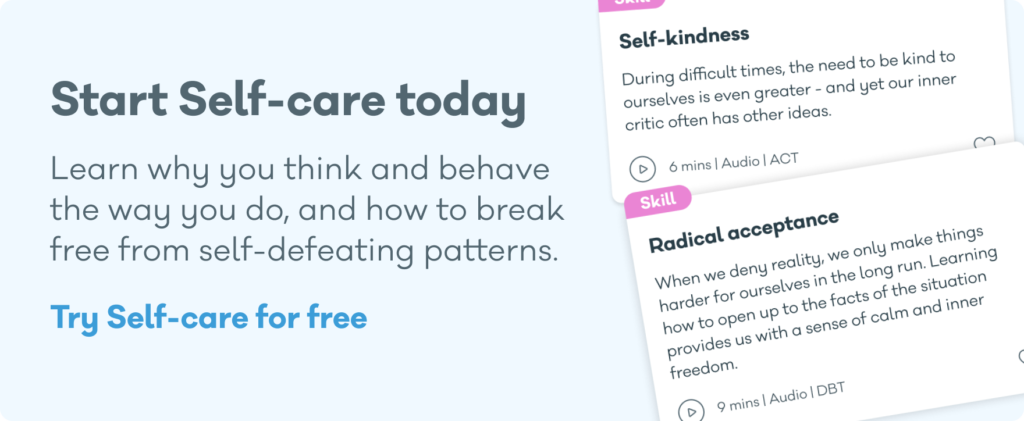Let’s be honest: being single on Valentine’s day can be tough.
You’re greeted with pink hearts, roses and sweet nothings like ‘be mine’ everywhere you look. And if you don’t have someone to share the holiday with, it can put a real dent in your confidence.
But, despite what the media tells us, this hallmark holiday doesn’t have to leave you feeling blue.
We’re often conditioned to look outside of ourselves for validation. But, regardless of whether you’re single, in a relationship or married, your sense of self-worth shouldn’t be defined by those around you.
The reality is, even though we crave meaningful connection with others, the most important relationship we’ll ever have is with the person in the mirror. Because, ultimately, we can only connect to people as deeply as we can connect to ourselves.
Although there’s 7 billion people on the planet, no one knows you quite like yourself. Sure you can become intimately close with people, and it may feel like they know your innermost thoughts and feelings. With time, it might even feel like they can read your mind because they know you so well. But, at the end of the day, no one will ever get you like you do.
No matter where you go, you’ll always have yourself to count on, so show yourself some extra love. Because self-love shouldn’t just be a cute mantra or slogan, it should be a way of life.
So, let’s make Valentine’s Day a little different this year. Let’s pledge to show ourselves self-love, not just this holiday season but all 365 days of the year.
It’s not selfish or self-indulgent. And it doesn’t mean you have to always prioritise your needs over everyone else’s.
If anything, having a good relationship with yourself, is a selfless act. Because how you treat others is often a reflection of how you treat yourself.
Why is it important to have a good relationship with yourself?
Developing a good relationship with yourself is vital for good mental wellbeing. Here are just a few reasons why…
- Loving yourself sets the tone for the relationships you have with other people. A lack of self-love could make you a magnet for dysfunctional relationships because when you truly love yourself, it’s harder to tolerate when others treat you poorly.
- Having a good relationship with yourself is the first step towards building your self-esteem. Because if you’re always looking for external forces to affirm your sense of self-worth, chances are you’ll probably be disappointed. Instead, this reassurance should come from within.
- When you’re grounded in your own beliefs and interests you’re less likely to cave to societal pressures to be or behave a certain way.
- Without developing a good relationship with yourself, you may fall into bad habits like people-pleasing and perfectionism, and you may be more likely to tolerate abuse or mistreatment.
- Being in tune with your values makes it easier to live a life that’s authentically you.
- Self-love gives us the courage to be assertive, make decisions and set boundaries in our lives.
Tips to help you love yourself
Can you honestly say you love yourself? Sometimes it’s not so simple. We often believe that we love ourselves — but our actions may say otherwise.
Despite the hashtags and motivational phrases on social media, practising self-love is easier said than done. With this in mind, we’ve compiled a few practical tips to get you started:
Find your values and purpose
How well do you know yourself? We spend every waking moment with ourselves so we should know exactly who we are, right? Well, not necessarily…
Between societal pressures and our own projections of how we should be, it’s easy to lose sight of who we truly are. And how can we ever show ourselves real love and compassion if we don’t know what makes us tick?
That’s why, if you want to treat yourself well, it’s important to take time to tap into you. Invest time getting to know your interests, likes and values and use them to practice self-love.
Prioritise self-care
Self-care is about much more than face masks, bubble baths and soothing cups of tea. Because, as nice as those things are, they only scratch the surface.
Self-care is really about putting in the work to become a better you. It’s about tackling the bad habits and self-defeating patterns that hold you back from being the best version of yourself. And it’s about showing yourself love and kindness.
From self-soothing kits and personal crisis plans to guided meditations and journaling, there are plenty of therapy techniques you can add to your emotional toolkit. Check out Self-care, our audio and video therapy library, if you need an extra bit of guidance.

Be mindful
Life is hectic, and it’s easy to feel like we’re in autopilot mode, moving from one task to another. That’s why mindfulness is so clever. It helps to ground ourselves in the present moment and allows us to get to know ourselves.
You might opt for mindful meditation and breathing exercises to help reconnect with your body. Or maybe you could try a mindful walk or mindful eating?
Approaching the little things in life with curiosity is a great way to tune into our emotions and discover what brings us joy.
Tackle your inner critic
Let’s say your partner or a friend is upset. You wouldn’t ignore them, shun them or tell them to ‘get over it’. Chances are you’d offer practical support or a shoulder to cry on.
Now imagine you’re going through a tough patch. Maybe you’re sad, anxious, or made a mistake. If you’re being really honest, would you offer yourself the same compassion — or would your inner critic take hold?
An inner critic isn’t a bad thing. In fact, we all have one. It’s a collection of voices from our childhood that originally developed as a way to protect us from judgement and shame. But as we get older, this little voice can become harsh, critical and quick to judge.
It can cause real damage too. When your worst critic is yourself, how can you practice self-love? How can you grow and become the best version of yourself when you’re always tearing yourself down? That’s why it’s so important to try and hush this unnecessary criticism.
So next time that niggling voice pipes up, ask yourself: is this criticism really true? Could there be any other explanation? Then take a moment to recognise the emotions you’re feeling. Acknowledge how tough the situation is.
You might even want to say this aloud or jot down some comforting words. Alternatively, you might want to gently place your hand on your face to soothe yourself. For further advice, try listening to the ‘Self-Kindness’ or ‘Antidote to Self-criticism’ episodes of Self-care.
Set boundaries
Many of us have trouble setting boundaries. It may be down to a need for people-please, a fear of being assertive or unhelpful role models growing up.
Whatever the reason, a lack of boundaries can wreak havoc with our mental wellbeing. That’s why, if you’re feeling stressed, burned out or just a little overwhelmed, resetting your boundaries is a good place to start.
Boundaries essentially act as an invisible rope: securing our integrity, letting us know when people cross a line and directing us towards healthier choices. Most importantly, though, they help us preserve our time and energy for the things that matter most.
Remember your time is precious so it’s not selfish to prioritise yourself. If anything, carving out a bit of ‘me’ time and knowing your boundaries can liberate us from painful emotions, help us figure out who we are and allow us to develop healthier relationships with others.
Tune into your body
When you look at yourself in the mirror, what do you see? Are you happy with how you look?
If not, don’t worry, you’re not alone. Every day we’re barraged with flawless, Photoshopped images of muscular arms, flat stomachs and flawless skin. And it’s only natural that we might start to apply these impossible standards to ourselves.
In fact, in 2019, the Mental Health Foundation found that an alarming 1 in 5 adults felt shame about their body image, with 1 in 5 citing social media as the main culprit.
But it isn’t helpful to nit pick at your appearance. It happens to the best of us, but constantly criticising how we look can really tarnish our self-esteem.
If you want to better your relationship with yourself, take a moment to practice self-compassion. Remember bodies come in all shapes, size and abilities, so there’s no ‘right’ way to have a body.
Try to champion the quirks that make you uniquely you and, if that seems too tricky, a good middle-ground might be to praise your body for its abilities rather than for its aesthetics (for example, celebrate your strength, your dexterity when playing the piano etc.).

Don’t numb your feelings
When complicated feelings bubble to the surface it can be tempting to numb them with alcohol, drugs or other unhelpful habits. But, in the long run, this can do more harm than good.
Suppressing your emotions helps no one, in fact, it could lead to addiction and low self-esteem. So, if you’re struggling, speak to your GP, therapist or reach out to a charitable organisation like Alcoholics Anonymous, FRANK or We Are With You.
Develop your emotional intelligence
If you want to really improve your relationship with yourself, the first step is to make space for your emotions and lean into them. If this seems like a daunting task and you don’t know where to start, remember you don’t have to do it alone.
Speaking to a psychologist might be a better solution. It provides a safe space where you can sift through your emotions, get to the root cause behind them and learn strategies to help you cope.
Developing a positive relationship with yourself is by no means easy. You might face obstacles or veer off course. But stick with it.
Because when you show yourself kindness, you’ll find that you naturally radiate this out into the world. And you’ll probably find that you become a better, happier version of yourself too.
